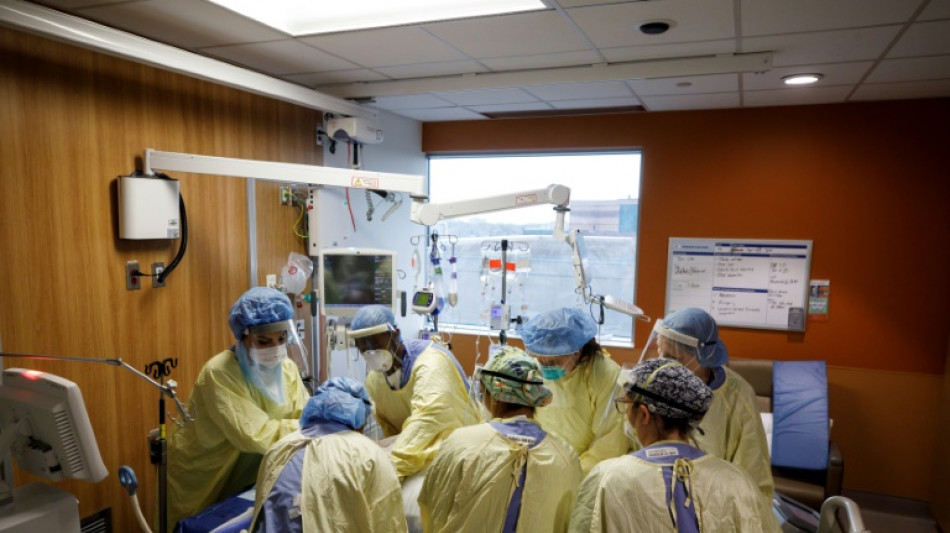
-
 Australia all out for 152 as England take charge of 4th Ashes Test
Australia all out for 152 as England take charge of 4th Ashes Test
-
Boys recount 'torment' at hands of armed rebels in DR Congo

-
 Inside Chernobyl, Ukraine scrambles to repair radiation shield
Inside Chernobyl, Ukraine scrambles to repair radiation shield
-
Bondi victims honoured as Sydney-Hobart race sets sail

-
 North Korea's Kim orders factories to make more missiles in 2026
North Korea's Kim orders factories to make more missiles in 2026
-
Palladino's Atalanta on the up as Serie A leaders Inter visit

-
 Hooked on the claw: how crane games conquered Japan's arcades
Hooked on the claw: how crane games conquered Japan's arcades
-
Shanghai's elderly waltz back to the past at lunchtime dance halls

-
 Japan govt approves record 122 trillion yen budget
Japan govt approves record 122 trillion yen budget
-
US launches Christmas Day strikes on IS targets in Nigeria

-
 Australia reeling on 72-4 at lunch as England strike in 4th Ashes Test
Australia reeling on 72-4 at lunch as England strike in 4th Ashes Test
-
Too hot to handle? Searing heat looming over 2026 World Cup

-
 Packers clinch NFL playoff spot as Lions lose to Vikings
Packers clinch NFL playoff spot as Lions lose to Vikings
-
Guinea's presidential candidates hold final rallies before Sunday's vote

-
 Eon Prime Intelligent Alliance Office Unveils New Brand Identity and Completes Website Upgrade
Eon Prime Intelligent Alliance Office Unveils New Brand Identity and Completes Website Upgrade
-
Villa face Chelsea test as Premier League title race heats up

-
 Spurs extend domination of NBA-best Thunder
Spurs extend domination of NBA-best Thunder
-
Malaysia's Najib to face verdict in mega 1MDB graft trial

-
 King Charles calls for 'reconciliation' in Christmas speech
King Charles calls for 'reconciliation' in Christmas speech
-
Brazil's jailed ex-president Bolsonaro undergoes 'successful' surgery

-
 UK tech campaigner sues Trump administration over US sanctions
UK tech campaigner sues Trump administration over US sanctions
-
New Anglican leader says immigration debate dividing UK

-
 Russia says made 'proposal' to France over jailed researcher
Russia says made 'proposal' to France over jailed researcher
-
Bangladesh PM hopeful Rahman returns from exile ahead of polls

-
 Police suspect suicide bomber behind Nigeria's deadly mosque blast
Police suspect suicide bomber behind Nigeria's deadly mosque blast
-
AFCON organisers allowing fans in for free to fill empty stands: source

-
 Mali coach Saintfiet hits out at European clubs, FIFA over AFCON changes
Mali coach Saintfiet hits out at European clubs, FIFA over AFCON changes
-
Last Christians gather in ruins of Turkey's quake-hit Antakya

-
 Pope Leo condemns 'open wounds' of war in first Christmas homily
Pope Leo condemns 'open wounds' of war in first Christmas homily
-
Mogadishu votes in first local elections in decades under tight security

-
 'Starting anew': Indonesians in disaster-struck Sumatra hold Christmas mass
'Starting anew': Indonesians in disaster-struck Sumatra hold Christmas mass
-
Cambodian PM's wife attends funerals of soldiers killed in Thai border clashes

-
 Prime minister hopeful Tarique Rahman arrives in Bangladesh: party
Prime minister hopeful Tarique Rahman arrives in Bangladesh: party
-
Pacific archipelago Palau agrees to take migrants from US

-
 Pope Leo expected to call for peace during first Christmas blessing
Pope Leo expected to call for peace during first Christmas blessing
-
Australia opts for all-pace attack in fourth Ashes Test

-
 'We hold onto one another and keep fighting,' says wife of jailed Istanbul mayor
'We hold onto one another and keep fighting,' says wife of jailed Istanbul mayor
-
North Korea's Kim visits nuclear subs as Putin hails 'invincible' bond

-
 Trump takes Christmas Eve shot at 'radical left scum'
Trump takes Christmas Eve shot at 'radical left scum'
-
3 Factors That Affect the Cost of Dentures in San Antonio, TX

-
 Leo XIV celebrates first Christmas as pope
Leo XIV celebrates first Christmas as pope
-
Diallo and Mahrez strike at AFCON as Ivory Coast, Algeria win

-
 'At your service!' Nasry Asfura becomes Honduran president-elect
'At your service!' Nasry Asfura becomes Honduran president-elect
-
Trump-backed Nasry Asfura declared winner of Honduras presidency

-
 Diallo strikes to give AFCON holders Ivory Coast winning start
Diallo strikes to give AFCON holders Ivory Coast winning start
-
Spurs captain Romero facing increased ban after Liverpool red card

-
 Bolivian miners protest elimination of fuel subsidies
Bolivian miners protest elimination of fuel subsidies
-
A lack of respect? African football bows to pressure with AFCON change

-
 Trump says comedian Colbert should be 'put to sleep'
Trump says comedian Colbert should be 'put to sleep'
-
Mahrez leads Algeria to AFCON cruise against Sudan


Nursing shortage forces emergency room closures across Canada
An acute nursing shortage is clogging or even closing hospital emergency rooms across Canada, pushing an already stressed national health system to the brink with potentially severe consequences for patient care.
Burnout from the Covid-19 pandemic, abuse from patients and salary discontent have seen nursing staff quitting their jobs in droves, and experts say the situation is only likely to worsen.
The impact on emergency care is such that Ottawa police recently had to take a shooting victim to hospital in their squad car, rather than wait for an ambulance, and an elderly woman who fell and broke her hip was forced to wait six hours for help from paramedics based 100 kilometers (62 miles) away.
Over the summer and into the fall, staffing shortages meant dozens of emergency rooms were forced to close -- sometimes for a night or a weekend, sometimes longer.
Wait times to see an ER doctor have soared to 12, 16, 20 hours -- or more.
"They're numb, deflated and feeling hopeless," said Cathryn Hoy, president of the Ontario Nurses' Association. Herself a nurse for 20 years, she described the situation as "critical."
Amelie Inard, 32, was taken to an ER in Montreal this week, in extreme pain and peeing blood.
The place was packed, and an overwrought nurse told her to describe her condition "in one sentence, really quickly, because of how busy they were," Inard said.
She eventually left in frustration, without seeing a doctor.
Hospital workloads are rising, Hoy said, along with patients' exasperation over extended wait times, leading to a spiking of violence against nurses.
Several nurses told AFP they had been punched, scratched or spat on, and had trays, dishes and feces thrown at them.
- 'Crazy conditions' -
In the capital Ottawa, ambulances were unavailable on more than 1,000 occasions from January to July, as paramedics were stuck waiting to unload patients at crowded ERs.
A hospital in Peterborough, east of Toronto, in the past week was forced to treat patients on gurneys in the parking lot because its ER was full, said Hoy.
In Manitoba, doctor Merril Pauls said there had been "multiple times throughout the summer when we had to shut down beds in the emergency room" at Winnipeg's Health Sciences Centre because of the nursing shortage.
On one recent Sunday, he said, "We had too many people coming in and had no place to put them. We literally were double-bunking critical patients in a resuscitation bay.
"Our nurses are really working in crazy conditions."
It's a "really significant phenomenon going on across the country," the doctor added, and it's "getting worse."
- High turnover -
A recent survey by the Canadian Union of Public Employees, the country's largest labor union, found that 87 percent of nurses have considered leaving their job "because of the thankless and grueling working conditions."
"Even new graduates are quitting," Hoy said.
Federal health minister Jean-Yves Duclos has vowed to make it easier for foreign credentials to be recognized. That could help 11,000 internationally trained doctors and nurses get jobs in their field in Canada.
But that won't be nearly enough, with 34,400 nursing positions now vacant, according to government data.
Compounding the problem, many Canadians -- like Inard -- don't have a family doctor and turn to emergency rooms for care.
"It's just so difficult to find a family doctor," she said.
And a frequent shortage of regular hospital beds often means long waits to transfer patients out of ERs to wards.
Ontario passed a bill at the end of September permitting transfers of patients awaiting long-term care to facilities up to 150 kilometers away.
Provincial Health Minister Sylvia Jones said it would "ease pressures on crowded emergency departments."
But critics say it could force frail, elderly people into care homes far from their loved ones.
For now, almost everyone needing treatment is eventually seen. But delays can pose long-term consequences for patients' health.
"If a stroke patient doesn't get access to a clot-busting medicine fast, brain cells will die and the patient will end up being more disabled than they would have been," Pauls said.
Serious infections can be deadly if not treated in time. So, too, can cancers and other diseases, he added.
Pauls recalled routinely telling discharged patients "to come back if things get worse."
"But now they laugh at us. They say: 'You're crazy. There's no way I'm going to go through this again.'"
P.Stevenson--AMWN


